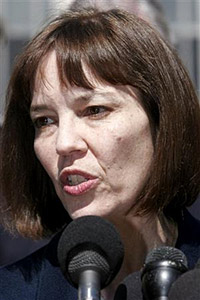 |
 |
 |
 News from Around the Americas | October 2005 News from Around the Americas | October 2005  
NY Times Reporter Breaks Silence in CIA Leak Case
 Adam Entous - Reuters Adam Entous - Reuters


| | New York Times reporter Judith Miller speaks outside the U.S. Federal District Court in Washington D.C. September 30, 2005. (Micah Walter/Reuters) |
Washington - Ending her standoff with federal prosecutors after nearly three months in jail, New York Times reporter Judith Miller appeared before a federal grand jury on Friday investigating who in the Bush administration leaked a covert CIA operative's identity.

Miller agreed to break her silence and testify after receiving what she described as a voluntary and personal waiver of confidentiality from her source, identified as Vice President Dick Cheney's chief of staff, Lewis Libby.

Lawyers close to the case said Miller's testimony appeared to clear the way for prosecutor Patrick Fitzgerald to wrap up his 2-year-old inquiry into who leaked CIA operative Valerie Plame's identity and whether any laws were violated.

Plame's diplomat husband, Joseph Wilson, said the administration had leaked her name, damaging her ability to work undercover, to get back at him for criticising President George W. Bush's Iraq policy.

With Miller's testimony, lawyers said, Fitzgerald could move quickly to bring indictments in the case. Or he may conclude that no crime was committed and end his investigation and possibly issue a report on his findings.

The outcome could shake up the Bush White House, already reeling from criticism over its response to Hurricane Katrina and Wednesday's indictment of House Republican leader Tom DeLay.

The leak investigation has ensnarled Bush's top political adviser, Karl Rove, as well as Libby. The White House had long maintained that they had nothing to do with the leak.

Asked if he felt burnt by Rove and Libby when he earlier told the press corps they were not involved, White House spokesman Scott McClellan said: "It is an ongoing investigation and, as such, our policy has been and continues to be not to comment."

He said Bush "wants to get to the bottom of it."

Miller, who was sent to jail on July 6 although she never wrote an article about the Plame matter, had no comment before entering the federal court house to begin her testimony.

Viewed by some as a martyr for press freedom, Miller has faced criticism in the past for some of her pre-war news reports on Iraq's alleged weapons programs. Critics say those reports helped boost the administration's case that Iraq posed a threat. No weapons of mass destruction were found.

Release

Miller was released on Thursday from the Alexandria Detention Centre outside Washington after she and her lawyers reached agreement with Fitzgerald about the scope of her testimony.

Cheney spokeswoman Lea Anne McBride said on behalf of Libby: "It's an ongoing investigation and one in which we are fully cooperating."

Rove's attorney, Robert Luskin, said: "This doesn't involve Karl and he has not been contacted" by Fitzgerald.

Legal sources close to the case said Miller was under growing pressure to testify because Fitzgerald could have sought to impose a stiffer criminal sentence against her.

A spokesman for Fitzgerald declined to comment. Fitzgerald had indicated earlier this year that he could wrap up his investigation once he obtained the testimony of Miller, lawyers involved in the case said.

Fitzgerald had already secured the cooperation of Time magazine reporter Matthew Cooper, who agreed to testify after saying he received the "express personal consent" of his source to reveal his identity.

Cooper told the grand jury that Rove was the first person to tell him about Plame, although Cooper said Rove did not disclose her name. Cooper said he also discussed her and her husband with Libby.

Syndicated newspaper columnist Robert Novak first revealed Plame's identity in a column on July 14, 2003, citing two administration officials, shortly after Wilson, on July 14, published an opinion piece in The New York Times that accused the administration of twisting intelligence on Iraq.

According to The Times, Miller met with Libby on July 8, 2003, and talked with him by telephone later that week.

Plame's husband has long asserted the leak was meant in retaliation for his criticism of Bush's Iraq policy in 2003 related to a CIA-funded trip to investigate whether Niger helped supply nuclear materials to Baghdad.

Wilson said his report that he found no evidence of Iraq trying to get nuclear materials from Niger was ignored by Bush, who used such a charge as part of his justification for invading Iraq.

After initially promising to fire anyone found to have leaked information in the case, Bush in July offered a more qualified pledge: "If someone committed a crime they will no longer work in my administration."

Prominent Democrats have called on Bush to fire Rove, the architect of his two presidential election victories and now his deputy chief of staff, or block his access to classified information.

Rove's attorneys said Rove did nothing wrong. | 
 | |
 |



